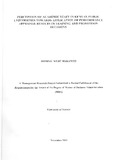| dc.description.abstract | Kenyan public universities have experienced a decline in performance exemplified by
enrolment of less than 35% of qualifying students, near collapse of physical facilities,
lack of relevance of curricular and low quality of teaching and research (Chacha-
Nyaigoti, 2004; Gudo et al., 2011). Stakeholder demands for accountability have
escalated inevitably cascading to academic staff, the principal actors in university
operations. Despite the reputed usefulness of performance appraisal systems in
ameliorating such challenges (Boswell and Boudreau, 2002; Fletcher, 2002), universities
worldwide have hitherto adopted a laissez- faire attitude towards these systems, claiming
that they are managerialist and, therefore, inappropriate to a collegial context which value
collaborative and developmental tasks. Using survey data from 276 multi-disciplinary
academic staff and interviews with 3 human resource managers from 7 Kenyan
universities, this study examined the perceptions of academic staff on application of
performance appraisal results in training and promotion decisions. Descriptive statistics,
correlation and content analyses were used to analyze data. The study revealed that
respondents were ambivalent as to whether performance assessment systems were used
for developmental or managerialist purposes. Nevertheless, univerisity funding support
for academic staff training and performance appraisal purpose of providing feedback
yielded significant results (β = 0.30, p < 0.05). Moreover, the study found a relationship
between managerialist performance appraisal purposes and promotion decisions (β =
0.325, p < 0.01). Consistent with the literature, the study concluded that performance
appraisal systems are not entrenched in public universities in Kenya. It was
recommended that top management investigate the barriers to implementation of
performance appraisal systems. The findings of the study may contribute to the theory and practice by facilitating better design of performance appraisal systems. Future
research could focus on contextual variables and adopt qualitative design for establishing
causal relationships. | en |

